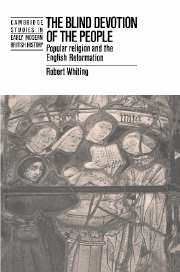Book contents
- Frontmatter
- Contents
- List of illustrations
- Preface
- Note
- 1 Introduction
- 2 Survey
- PART ONE ASSESSMENT
- PART TWO EXPLANATION
- 8 Spiritual motivations: Lutheranism, Calvinism and other faiths
- 9 Non-spiritual motivations: politics, economics and other forces
- 10 Mediate influences: literature, drama and art
- 11 Immediate influences: example, action and oral communication
- 12 Summation of Part Two
- 13 Perspective
- Appendix 1 Maps
- Appendix 2 Graphs
- Bibliography and abbreviations
- Index
9 - Non-spiritual motivations: politics, economics and other forces
Published online by Cambridge University Press: 11 December 2009
- Frontmatter
- Contents
- List of illustrations
- Preface
- Note
- 1 Introduction
- 2 Survey
- PART ONE ASSESSMENT
- PART TWO EXPLANATION
- 8 Spiritual motivations: Lutheranism, Calvinism and other faiths
- 9 Non-spiritual motivations: politics, economics and other forces
- 10 Mediate influences: literature, drama and art
- 11 Immediate influences: example, action and oral communication
- 12 Summation of Part Two
- 13 Perspective
- Appendix 1 Maps
- Appendix 2 Graphs
- Bibliography and abbreviations
- Index
Summary
Before 1570, no more than a restricted minority of south-western people experienced a spiritual conversion to the Protestant faith. In order to understand responses to the assault upon traditional religion, it is therefore imperative to examine carefully the range of essentially non-spiritual impulses by which these responses might also be conditioned.
By no means the least powerful of these impulses was the Tudor Englishman's sense of obligation to established authorities. Among the most frequently reiterated axioms of political thought were the divine approbation of the government, the moral duty of obedience, and the consequent sinfulness of resistance. Though couched in the language of theology, such beliefs transcended religious divisions and were asserted by Protestant, Catholic and neutral alike. ‘In the Bible’, the south-western rebels were told by Philip Nichols in 1549, ‘ye should have learned that princes and magistrates are the ministers of God, and therefore thoroughly to be obeyed; and that no man ought to speak evil of them, much less to resist them or arise against them.’ ‘God's most holy word’, he assured them, ‘pronounceth a plain sentence of eternal damnation upon all such as be seditious rebels against their kings or magistrates.’ In 1562 the Protestants of South Molton were similarly reminded (by William Ramsey) of their compelling duty to obey their rulers.
Nor was this sense of obligation confined to Protestants.
- Type
- Chapter
- Information
- The Blind Devotion of the PeoplePopular Religion and the English Reformation, pp. 172 - 187Publisher: Cambridge University PressPrint publication year: 1989



